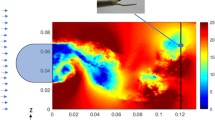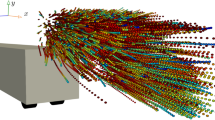Abstract
In this article a 3-d particle tracking velocimetry system (PTV system) is presented which enables the investigation of relatively fast gaseous (air) flows and tiny turbulences in a small scaled wind tunnel. To satisfy the demand of a high spatial and temporal resolution, a sufficiently high tracer particle concentration has to be applied to the gas. Solving the correspondence problem among different cameras becomes extremely difficult due to ambiguities: Each tracer has to be found in all pictures of the different views during many successive time steps. Here, the correspondence problem is facilitated by the use of coloured particles and the application of suitable classifiers for particle classification.
Preview
Unable to display preview. Download preview PDF.
Similar content being viewed by others
References
Albrecht, P., Michaelis, B.: Improvement of the Spatial Resolution of an Optical 3–D Measurement Procedure. IEEE Transactions on Instrumentation and Measurement 47(1), 158–162 (1998)
Albertz, J., Wiggenhagen, M.: Guide for Photogrammetry and Remote Sensing, 5th edn. Herbert–Wichmann Verlag (2009)
Bordas, R., Bendicks, C., Kuhn, R., Wunderlich, B., Thevenin, D., Michaelis, B.: Coloured tracer particles employed for 3d-ptv in gas flows. In: ISFV13 - 13th International Symposium on Flow Visualization, and FLUVISU12 - 12th French Congress on Visualization in Fluid Mechanics, Paper #93, Nice, July 1-4 (2008)
Chang, C.-C., Lin., C.-J.: LIBSVM: a library for support vector machines (2009), http://www.csie.ntu.edu.tw/~cjlin/libsvm
Ouellette, N.T., Xu, H., Bodenschatz, E.: A quantitative study of three-dimensional Lagrangian particle tracking algorithms. Experiments in Fluids 40(2), 301–313 (2006)
Crocker, J.C., Grier, D.G.: Methods of digital video microscopy for colloidal studies. J. Coll. Interface Sci. 179, 298–310 (1996)
ANSYS: FLUENT Flow Modeling Software, http://www.fluent.com
Ramanath, R., Snyder, W.E., Bilbro, G.L., Sander, W.A.: Demosaicking methods for Bayer color arrays. Journal of Electronic Imaging 11(2), 306–315 (2002)
Haykin, S.: Neural Networks: A Comprehensive Foundation. Prentice Hall, Englewood Cliffs (1998)
Herbrich, R.: Learning kernel Classifiers: theory and algorithms, ISBN:0-262-08306-X (2003)
Kuhn, R.W., Bordas, R., Wunderlich, B., Michaelis, B., Thevenin, D.: Colour class identification of tracers using artificial neural networks. In: 10th International Conference on Engineering Applications of Neural Networks, Thessaloniki, Greece (2007); 13/2/1-13/2/8
Maas, H.G.: Digitale Photogrammetrie in der dreidimensionalen Strömungsmesstechnik. Dissertation ETH Zürich Nr. 9665 (1992)
Maas, H.-G.: Complexity analysis for the determination of image correspondences in dense spatial target fields. In: International Archives of Photogrammetry and Remote Sensing, vol. XXIX, pp. 102–107 (1992)
Nissen, S., Nemerson, E.: Fast Artifical Neural Network, FANN (2009), http://leenissen.dk/fann/
Ruhnau, P., Guetter, C., Schnörr, C.: A Variational Approach for Particle Tracking Velocimetry, Measurement. Science and Technology 16, 1449–1458 (2005)
Shakhnarovich, G., Darrell, T., Indyk, P.: Nearest-Neighbor Methods in Learning and Vision: Theory and Practice, ISBN:978-0-262-19547-8 (2006)
Wu, T.F., Lin, C.J.: Probability Estimates for Multi-class Classification by Pair wise Coupling. Journal of Machine Learning Research 5, 975–1005 (2004)
Author information
Authors and Affiliations
Editor information
Editors and Affiliations
Rights and permissions
Copyright information
© 2009 Springer-Verlag Berlin Heidelberg
About this paper
Cite this paper
Bendicks, C., Tarlet, D., Michaelis, B., Thévenin, D., Wunderlich, B. (2009). Use of Coloured Tracers in Gas Flow Experiments for a Lagrangian Flow Analysis with Increased Tracer Density. In: Denzler, J., Notni, G., Süße, H. (eds) Pattern Recognition. DAGM 2009. Lecture Notes in Computer Science, vol 5748. Springer, Berlin, Heidelberg. https://doi.org/10.1007/978-3-642-03798-6_40
Download citation
DOI: https://doi.org/10.1007/978-3-642-03798-6_40
Publisher Name: Springer, Berlin, Heidelberg
Print ISBN: 978-3-642-03797-9
Online ISBN: 978-3-642-03798-6
eBook Packages: Computer ScienceComputer Science (R0)




